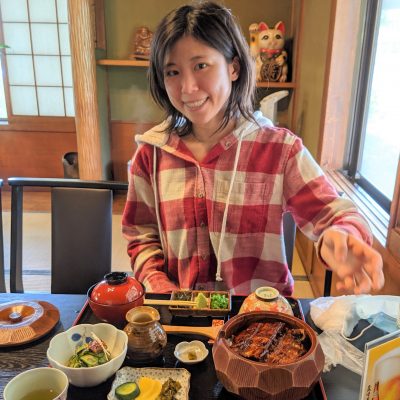Student Spotlight: Reika Tei

June 9, 2021
Reika Tei is a doctoral candidate in chemistry and chemical biology from Kyushu island in Japan. Having attended the University of Tokyo, Japan as an undergraduate, she chose to pursue further study at Cornell for the supportive environment, enthusiastic professors, and beauty of campus.
What is your area of research and why is it important?
My research interest lies in understanding how membrane lipids regulate cellular processes. I am especially focused on a specific type of lipid called phosphatidic acid (PA) and studying how different pools of PA (i.e., different structures and subcellular locations) can have different functions in cells. More specifically, I am working on the development of chemical and biological tools for controlling structures and locations of PA in cells and their applications to understand PA-mediated cellular events.
What are the larger implications of this research?
Cells have a very complicated and elaborate system. Tens of thousands of types of proteins, nucleic acids, lipids, and other small molecules work together to mediate cellular processes. Dysregulations in their functions can lead to numerous diseases, and thus understanding how they work is important for a better knowledge of human diseases and discovery of new therapeutic solutions. For example, PA is linked to cancer in several contexts, and we are interested in elucidating the underlying molecular mechanisms by a combination of chemical and biological approaches.
What does it mean to you to have received the Hsien and Daisy Yen Wu Scholarship?
I am greatly honored to receive the Hsien and Daisy Yen Wu Scholarship, and the scholarship fuels further motivation to pursue my career as an academic researcher.
What will this award allow you to do that you otherwise might not have been able to?
I have attended a workshop to learn the basics and introductory applications of deep learning. I had been doing basic programming to automate simple tasks for data analyses in my research, which have been very useful and greatly improved my efficiency. To further facilitate my research, I sought to learn deep learning and use it to program more complicated tasks, e.g., going through imaging data and automatically finding/isolating cells that are expressing specific marker proteins.
What are your hobbies or interests outside of your research or scholarship?
I love nature, especially trees, forests, and rivers, so Ithaca is a wonderful place for me! I really enjoy watching how trees transform their appearance from season to season, and I like taking photos of such scenery and driving around the state in my car. I sometimes take a day trip to Niagara Falls when I feel stressed.
Why did you choose Cornell to pursue your degree?
When I came to Cornell during the visitation weekend, I was totally enthralled by the beautiful campus as well as the modern setting of the lab (Weill Hall). I was also impressed by its supportive environment and the enthusiasm of professors I interacted with during/after the weekend, which further made up my mind to come to Cornell for my graduate study.
